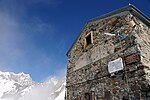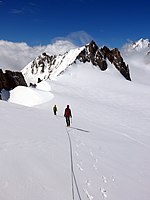The Mont Blanc Tunnel is a highway tunnel between France and Italy, under the Mont Blanc mountain in the Alps. It links Chamonix, Haute-Savoie, France with Courmayeur, Aosta Valley, Italy, via the French Route Nationale 205 and the Italian Traforo T1 (forming the European route E25), in particular the motorways serving Geneva (A40 of France) and Turin (A5 of Italy). The passageway is one of the major trans-Alpine transport routes, particularly for Italy, which relies on this tunnel for transporting as much as one-third of its freight to northern Europe. It reduces the route from France to Turin by 50 kilometres (30 miles) and to Milan by 100 km (60 mi). Northeast of Mont Blanc's summit, the tunnel is about 15 km (10 mi) southwest of the tripoint with Switzerland, near Mont Dolent.
The agreement between France and Italy on building a tunnel was signed in 1949. Two operating companies were founded, each responsible for one half of the tunnel: the French Autoroutes et tunnel du Mont-Blanc (ATMB), founded on 30 April 1958, and the Italian Società italiana per azioni per il Traforo del Monte Bianco (SITMB), founded on 1 September 1957. Drilling began in 1959 and was completed in 1962; the tunnel was opened to traffic on 19 July 1965.
The tunnel is 11.611 km (7.215 mi) in length, 8.6 m (28 ft) in width, and 4.35 m (14.3 ft) in height. The passageway is not horizontal, but in a slightly inverted "V", which assists ventilation. The tunnel consists of a single gallery with a two-lane dual direction road. At the time of its construction, it was three times longer than any existing highway tunnel.The tunnel passes almost exactly under the summit of the Aiguille du Midi. At this spot, it lies 2,480 metres (8,140 ft) beneath the surface, making it the world's second deepest operational tunnel after the Gotthard Base Tunnel.
The Mont Blanc Tunnel was originally managed by the two building companies. Following a fire in 1999 in which 39 people died, which showed how lack of coordination could hamper the safety of the tunnel, all the operations are managed by a single entity: MBT-EEIG, controlled by both ATMB and SITMB together, through a 50–50 shares distribution.An alternative route for road traffic between France to Italy is the Fréjus Road Tunnel. Road traffic grew steadily until 1994, even with the opening of the Fréjus tunnel. Since then, the combined traffic volume of the former has remained roughly constant.











